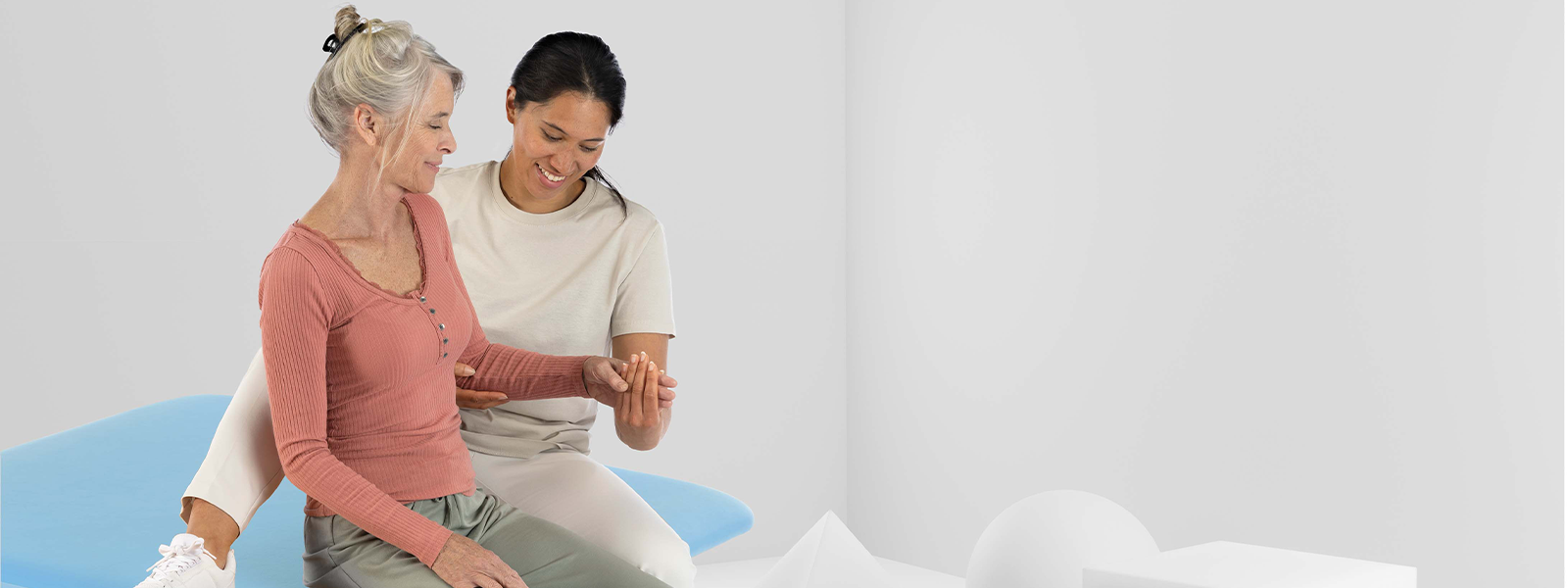Physiotherapy trends in 2023 are all about connection, prevention, and holism

Physiotherapy has always been a dynamic profession. Knowledge is constantly increasing thanks to the myriad of scientific studies, the physiotherapist’s area of expertise continues to expand with new techniques, and treatments on offer in the physiotherapy practice are shifting. In this blog we'll discuss what to expect in the physiotherapy field in 2023.
The physiotherapist in 2023
Naturally, developments in physiotherapy practice do not just come out of the blue. The trends have been present for some time in many practices, but the expectation is that other practices will soon follow. This year the focus is mainly on connection, prevention, and holism.
For instance, connections with other practices and disciplines are made through networks and a multidisciplinary approach. Multidisciplinary partnerships are becoming increasingly important. In addition, prevention is a central focus point, especially to avoid chronic health conditions. Finally, greater attention is paid to the mind and to health that focuses on the balance between body and mind.
The physiotherapist develops new skills to support this recent treatment method. For instance, they need new communication techniques, for example in the form of motivational interviewing: a method to stimulate the patient’s intrinsic motivation. But they also have to be communicative enough to be able to explain their hands-off approach to a patient who still mainly expects a hands-on treatment.
Below we take a closer look at three trends. For the domain 'holism' we discuss psychosomatics, chronic care is the focus of 'connection' and ‘holism’ zooms in on preventive care. Of course, the 'connection' domain covers many more parts of physiotherapy and not just chronic care.
Greater focus on the mind through a holistic approach
Greater balance of body and mind thanks to psychosomatic therapy
Social problems are responded to with greater attention to the mind, because psychosomatic patients are increasingly finding their way to physiotherapy practices. Within psychosomatics, this concerns patients with physical complaints that are clearly influenced by psychological factors. The psychosomatic therapist specialisation has been created for these patients. During a psychosomatic treatment session, exercise and training are combined with behavioural intervention, effective communication, and therapy for better body awareness.
However, also practices that do not (yet) have an in-house psychosomatic therapist are increasingly equipped to thoroughly assist this patient group. For example, therapists trained in pain and stress management, mindfulness, motivational interviewing, and Acceptance and Commitment Therapy (ACT).
Connection with other therapists, practices, and disciplines
Specific attention to chronic disorders
Chronic care is also occupying an increasingly important place within the practices. Chronic disorders are disorders with no prospect of full recovery and with a relatively long duration of illness.
The main chronic diseases are lung cancer, diabetes, cardiovascular disease, and COPD. The disorders occur at all ages, but are particularly common in the elderly. In fact: 96% of over-75s have a chronic disorder. And because people are getting older, the percentage of chronically ill people is rising.
During the treatment of a chronic disorder, the physiotherapist guides the patient in learning how to deal with pain and fatigue, limitations in functioning and problems in social participation.
Movement naturally plays an important role in this treatment. The hydraulic training system Gymna’s W-Move, a series of nine fitness machines, offers excellent support for this. For more information about this line of training equipment, please refer to our article ‘The benefits of exercise therapy for specific target groups’.
Prevention of chronic health conditions
Shift within the physiotherapy practice through focus on prevention and self-care
Chronic disorders clearly have a great influence on physical and mental well-being, so it is important to prevent these diseases as much as possible. This leads to a better quality of life and prevents unnecessary care. Many causes of chronic conditions can be influenced with preventive measures, such as a healthy lifestyle: no smoking, sufficient exercise, healthy eating and a healthy weight.
Moreover, the practice is increasingly focusing on prevention due to cuts and control of health care costs through insurance policies. The double aging of the population (the number of elderly people is rising and people are getting older) also plays a major role, because people want to continue to participate despite illness or old age. Within many physiotherapy practices, the offering is therefore increasingly shifting towards fitness, rehabilitation and programmes aimed at vitality and a healthy lifestyle.
Other apparent trends within physiotherapy
Nowadays, the physiotherapist focuses more on prevention and a more holistic treatment of the client. But other trends are also apparent. As patients become more critical, practices must focus more on visibility and distinction. As a result, small practices are getting bigger, teams are expanding with more specialisations, cooperation with other healthcare providers is becoming closer and the number of health centres is rising.
Digitisation within physiotherapy
In addition, there has been another development since the COVID pandemic: E-health. This is not only about the possibility of making appointments online, but also about holding a video consultation and easily receiving and following up on exercises.
TECAR and shockwave therapy
Finally, it may not be a typical trend for 2023, but in recent years scientific studies have also increasingly shown the positive effects of TECAR and Shockwave therapy.
Gymna can offer good support to practices that want to shift their focus to exercise therapy, but also to practices that want to expand their offering to include physical therapy. If you would like to more information about W-Move, physical therapy or related Gymna products, please feel free to contact us.
